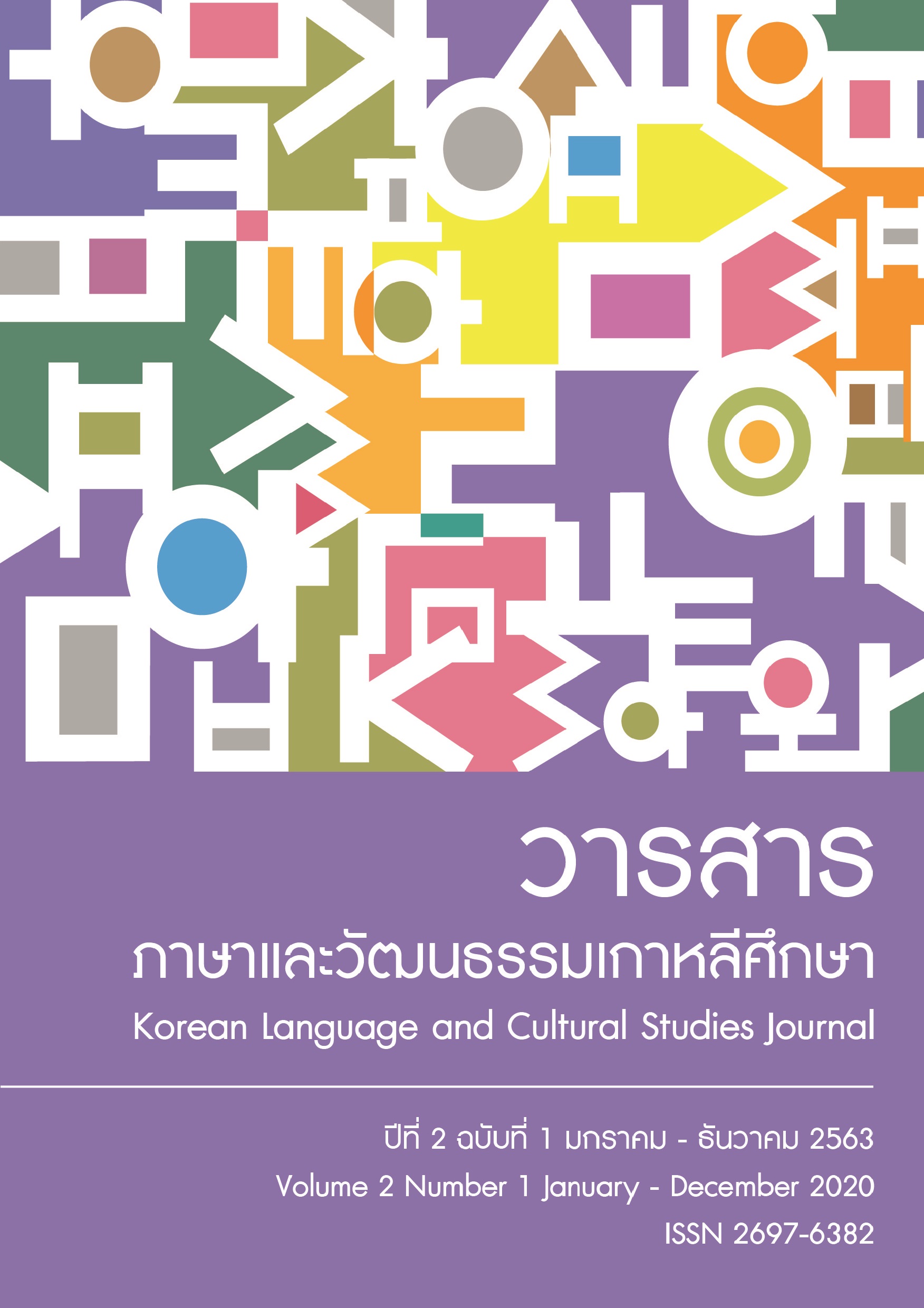การศึกษาความต้องการล่ามภาษาเกาหลีของตลาดแรงงานในประเทศไทย กรณีศึกษาประกาศรับสมัครงานออนไลน์
Main Article Content
บทคัดย่อ
บทความนี้มีวัตถุประสงค์ เพื่อศึกษาความต้องการล่ามภาษาเกาหลีในประเทศไทย เพื่อให้ทราบว่าสถานประกอบการที่ดำเนินกิจการธุรกิจประเภทใดต้องการล่ามภาษาเกาหลีมากที่สุด และล่ามภาษาเกาหลีควรมีคุณสมบัติใดบ้าง สถานประกอบการในพื้นที่จังหวัดใดมีความต้องการล่ามภาษาเกาหลีมากที่สุด ผู้วิจัยเก็บข้อมูลจากประกาศรับสมัครล่ามภาษาเกาหลี จํานวน 200 ประกาศจากเว็บไซต์สมัครงานและเพจประกาศงานล่ามภาษาเกาหลี จำนวน 15 แห่ง ตั้งแต่ วันที่ 1 กุมภาพันธ์ 2562 – 31 มกราคม 2563 จากนั้นจึงวิเคราะห์เนื้อหาข้อมูล ผลการวิจัยพบว่า ประเภทของสถานประกอบการที่ต้องการล่ามภาษาเกาหลีมากที่สุด คือ ธุรกิจบริการ (ร้อยละ 47.5) ได้แก่ ธุรกิจประเภทที่พักแรม ธุรกิจบริการด้านอาหาร รวมถึงธุรกิจประเภทบริการด้านสุขภาพหรือการแพทย์ รองลงมาคือ ธุรกิจพาณิชยกรรม (ร้อยละ 34.5) ตามด้วย ธุรกิจอุตสาหกรรมการผลิต (ร้อยละ 18) ตามลำดับ ผลการวิจัยชี้ให้เห็นว่า ควรมีการจัดการเรียนการสอนล่ามภาษาเกาหลีที่เน้นใช้ในธุรกิจประเภทการให้บริการให้กับนิสิตนักศึกษาระดับปริญญาตรีที่เรียนสาขาภาษาเกาหลีหรือสาขาที่เกี่ยวข้องกับเกาหลี เพื่อเตรียมความพร้อมก่อนเข้าสู่ตลาดแรงงาน และเพื่อเป็นการตอบสนองความต้องการล่ามของภาคธุรกิจ นอกจากนั้น ประกาศร้อยละ 82.5 เป็นสถานประกอบการสัญชาติเกาหลี และประกาศร้อยละ 12 เป็นสถานประกอบการสัญชาติไทย ผู้ประกอบการส่วนใหญ่ต้องการล่ามวุฒิการศึกษาปริญญาตรีสาขาภาษาเกาหลีหรือสาขาที่เกี่ยวข้องกับเกาหลี คุณสมบัติล่ามภาษาเกาหลีที่สถานประกอบการส่วนใหญ่ต้องการ คือ เป็นผู้มีทักษะการสื่อสารด้านการพูดและการฟังภาษาเกาหลีที่ดี มีทักษะการแปลและการล่าม และมีทักษะการใช้คอมพิวเตอร์ที่ดี คุณสมบัติพิเศษเพิ่มเติมที่ผู้ประกอบการต้องการ คือ ความสามารถในการสื่อสารด้านภาษาอังกฤษ และผลสำรวจพบว่า ประกาศร้อยละ 10.5 ต้องการผลสอบวัดระดับความถนัดทางภาษาเกาหลี (TOPIK) นอกจากนี้ สถานประกอบการในกรุงเทพมหานครมีความต้องการแรงงานมากที่สุด รองลงมาคือ ชลบุรี ตามด้วย ระยอง สมุทรปราการ
Article Details
เอกสารอ้างอิง
กรมพัฒนาธุรกิจการค้า. (2555). คู่มือการจัดประเภทธุรกิจของนิติบุคคล. สืบค้นเมื่อ 1 กุมภาพันธ์ 2563, จากhttps://www.dbd.go.th/
ทองทิพย์ พูลลาภ. (2559). ความต้องการล่ามในตลาดแรงงานไทย : การศึกษาประกาศรับสมัครงานออนไลน์. วารสารอักษรศาสตร์ จุฬาลงกรณ์มหาวิทยาลัย, 45(2), 263-303.
สถานเอกอัครราชทูตสาธารณรัฐเกาหลีประจำประเทศไทย. (2562). 동포현황. สืบค้นเมื่อ 3 กันยายน 2562, จาก http://overseas.mofa.go.kr/th-ko/brd/m_3215/list.do
สำนักงานสถิติแห่งชาติ. (2562). จำนวนนักท่องเที่ยวชาวต่างชาติที่เข้ามาประเทศไทย จำแนกตามสัญชาติ พ.ศ. 2552-2561. สืบค้นเมื่อ 12 ตุลาคม 2562, จาก http://statbbi.nso.go.th/staticreport/page/sector/th/17.aspx
สำนักงานคณะกรรมการนโยบายเขตพัฒนาพิเศษภาคตะวันออก. (2563). ไทยยกเกาหลีใต้ ‘หุ้นส่วนเศรษฐกิจ’ ที่แนบแน่น ชวนปักหลักลงทุนในไทย พร้อมเชื่อมสู่อาเซียน. สืบค้นเมื่อ 8 กุมภาพันธ์ 2563, จาก https://www.eeco.or.th /pr/news/ThailandKoreaBusinessPartnership
Maneerat Saeniang. (2560). การแยกประเภทธุรกิจ. สืบค้นเมื่อ 1 กุมภาพันธ์ 2563, จาก https://www.pymlo.com/th/การแยกประเภทธุรกิจ/


